Top Kubernetes Alternatives for Container Orchestration in 2025
Written by: Hrishikesh Pardeshi, Founder at Flexiple, buildd & Remote Tools.
Last updated: Feb 25, 2025
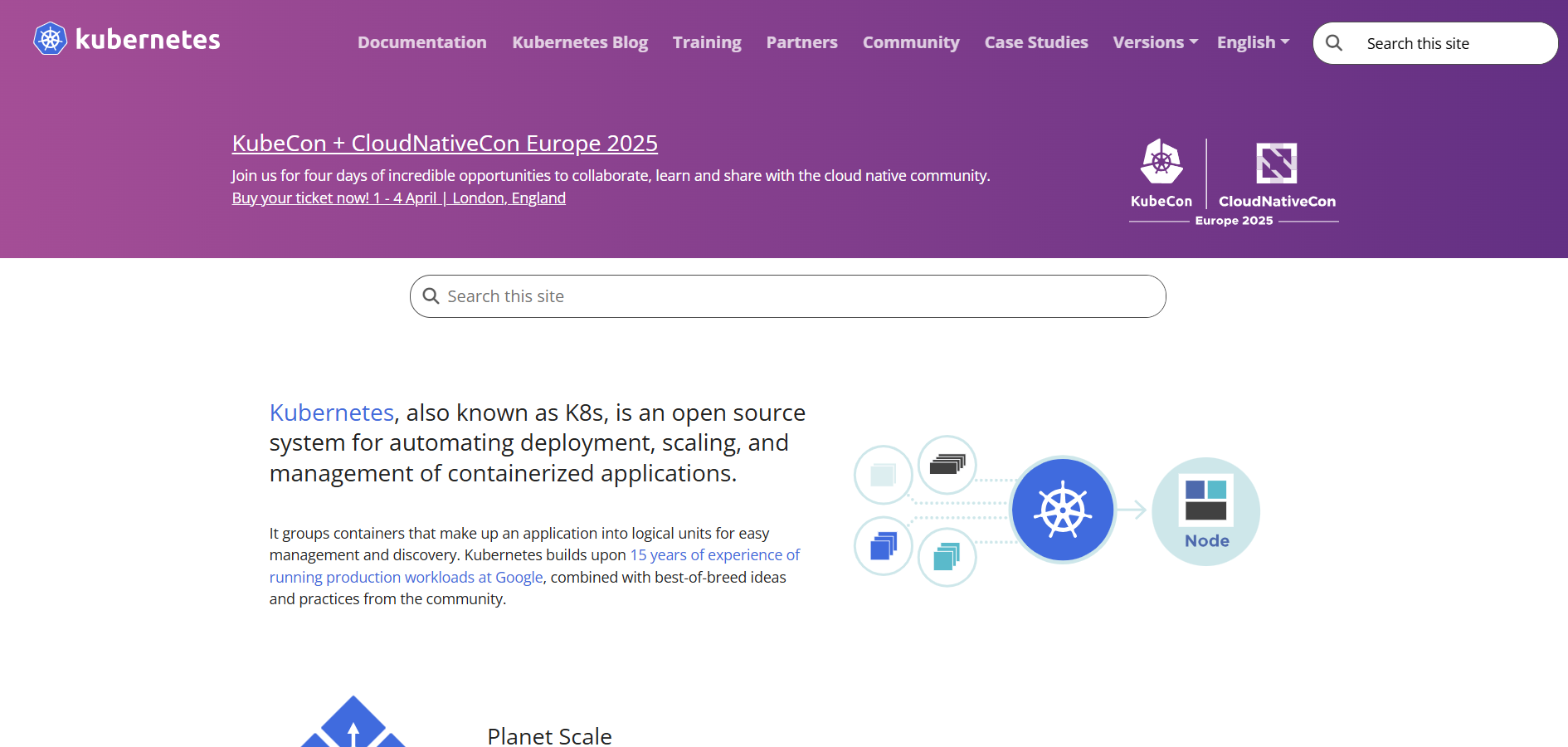
Best Kubernetes alternatives in 2025 are:
Docker Swarm
Docker Compose
Apache Mesos
OpenShift
Amazon ECS
Rancher
Nomad
MicroK8s
Choosing the right alternative to Kubernetes depends on your organization’s needs. If you’re looking for something simpler, lighter, or more tailored to specific workflows, there are plenty of great options. Whether you need a developer-friendly tool or a robust enterprise platform, this guide breaks down the top alternatives, including managed Kubernetes service, azure Kubernetes service, and azure container instances. We also explore offerings from major cloud providers like Google Cloud, highlighting their strengths and weaknesses to help you find the best fit.
Table of Contents
Why Do You Need Alternatives to Kubernetes?
As powerful as Kubernetes is, its complexity and resource overhead may not suit every organization. Many teams seek alternatives that offer simpler setups, lower learning curves, or specialized features tailored to specific use cases such as development, edge computing, or deep cloud integration with existing platforms. Evaluating other options can help you find a container orchestration platform that better aligns with your deployment scaling and management needs, budget, underlying infrastructure, and technical expertise.
If you're considering kubernetes alternatives for container orchestration, our comparative guide on Github alternatives can help you find reliable solutions to support your DevOps processes.
Who Should Consider Using Kubernetes Alternatives?
Organizations that find Kubernetes too complex, resource-intensive, or unnecessary for their scale should consider alternatives. Developers needing a lightweight orchestration tool, enterprises managing multi-cluster environments, and startups looking for cost-effective, easy-to-deploy solutions will benefit from exploring other options such as elastic load balancing, container deployment, and Google Kubernetes Engine.
Developers Seeking Simpler Orchestration
Developers who want a straightforward setup for local development and testing might find alternatives like Docker Compose or MicroK8s appealing. These tools provide a more streamlined experience without the steep learning curve associated with Kubernetes.
Enterprises Requiring Robust Management
Large organizations that need advanced features like multi-cluster management, enhanced security, and deep integration with cloud services may consider alternatives such as OpenShift, Amazon ECS, or Rancher to supplement or replace Kubernetes.
Organizations with Lightweight Needs
For teams that do not require the full complexity of Kubernetes, options like Docker Swarm, Nomad, or Apache Mesos offer more lightweight orchestration solutions that can be easier to manage and scale according to specific workloads.
Kubernetes Alternatives Comparison Table
| Feature | Docker Swarm | Docker Compose | Apache Mesos | OpenShift | Amazon ECS | Rancher | Nomad | MicroK8s |
|---|---|---|---|---|---|---|---|---|
| Ease of Use | Easy | Easy | Moderate | Moderate | Moderate | Easy | Moderate | Easy |
| Pricing | Free | Free | Free & Open Source | Free & Paid Plans | Pay-as-you-go | Free | Free | Free |
| Platform Support | Multi-platform | Multi-platform | Multi-platform | Enterprise-grade | AWS-based | Multi-cloud | Multi-platform | Lightweight Linux |
| Collaboration Features | Limited | Limited | Extensive | Extensive | Extensive | Extensive | Moderate | Moderate |
| Special Features | Native Docker Integration | Simple Multi-container Setup | Scalable Cluster Management | Enterprise Kubernetes Distribution | Deep AWS Integration | Multi-cluster Management | Lightweight & Flexible | Simplified Local Deployment |
Best Kubernetes Alternatives
Choosing the right alternative to Kubernetes can streamline your container orchestration strategy while reducing complexity and operational overhead. The following platforms provide a range of features—from simple, lightweight orchestration to robust enterprise solutions—ensuring that organizations of all sizes can find a tool that fits their needs. Here is a detailed look at the top Kubernetes alternatives available.
1. Docker Swarm
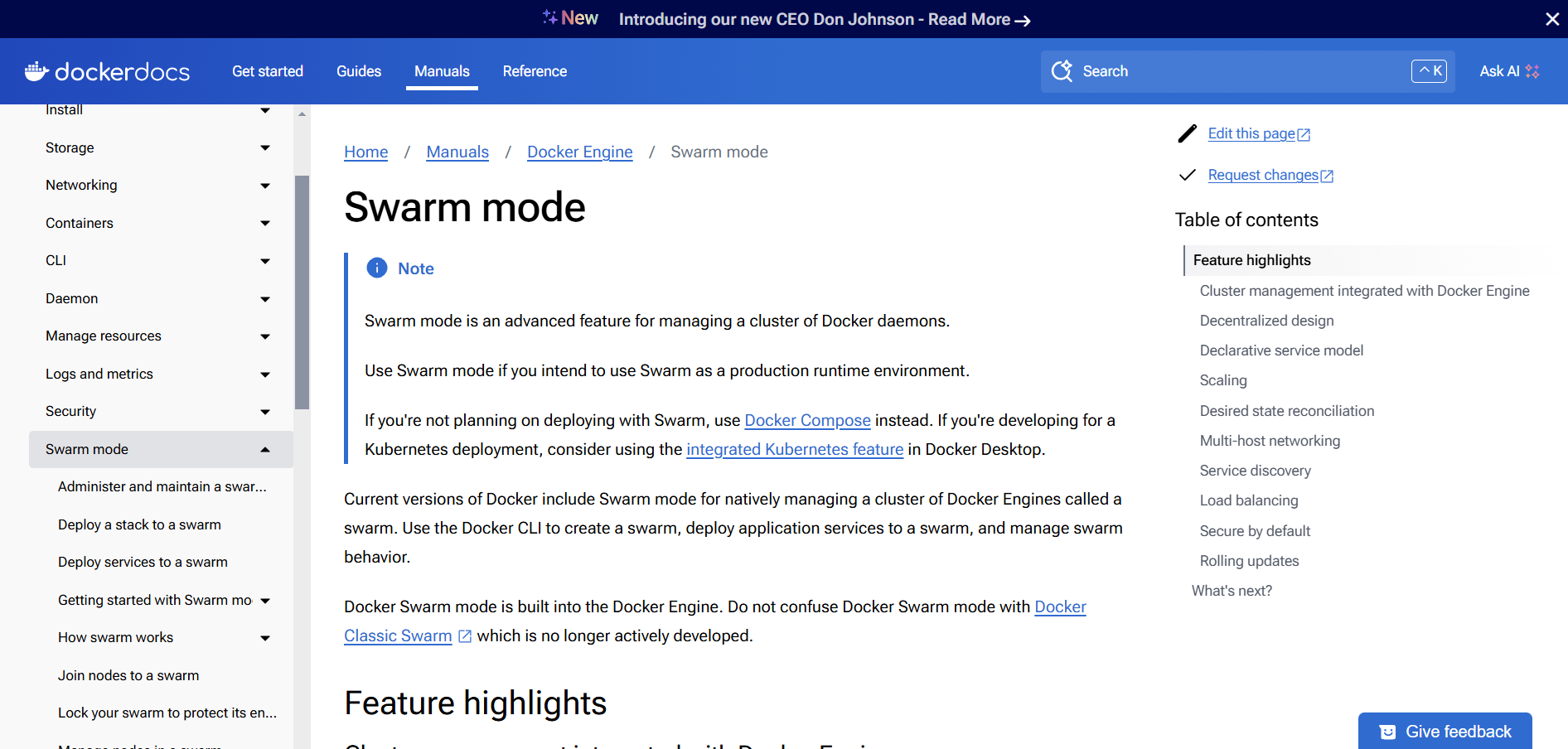
Docker Swarm is a native clustering and orchestration tool built into Docker. It simplifies container management by turning a pool of Docker hosts into a single, virtual Docker host. While it offers an easier learning curve compared to Kubernetes, it may lack some of the advanced features found in more comprehensive platforms.
Docker Swarm vs Kubernetes
Docker Swarm emphasizes simplicity and native Docker integration, making it an attractive option for teams already familiar with Docker. However, it offers fewer advanced orchestration features than Kubernetes, which might be a limitation for larger-scale or more complex deployments.
Key Features of Docker Swarm
Native integration with Docker
Simplified cluster management
Load balancing across services
Declarative service model
Easy scaling and rollbacks
Docker Swarm Pros
Easy to set up and use
Seamless integration with existing Docker tools
Lightweight and efficient for small clusters
Simplified management of containerized applications
Docker Swarm Cons
Limited advanced orchestration features
Not as scalable for very large clusters
Fewer community resources compared to Kubernetes
Docker Swarm Pricing
Docker Swarm is free to use for production environments. It does not require any licensing fees unless additional Docker services, such as Docker Trusted Registry (DTR) or Universal Control Plane (UCP), are utilized. These additional services are priced based on the number of nodes where the Docker daemon is installed.
2. Docker Compose
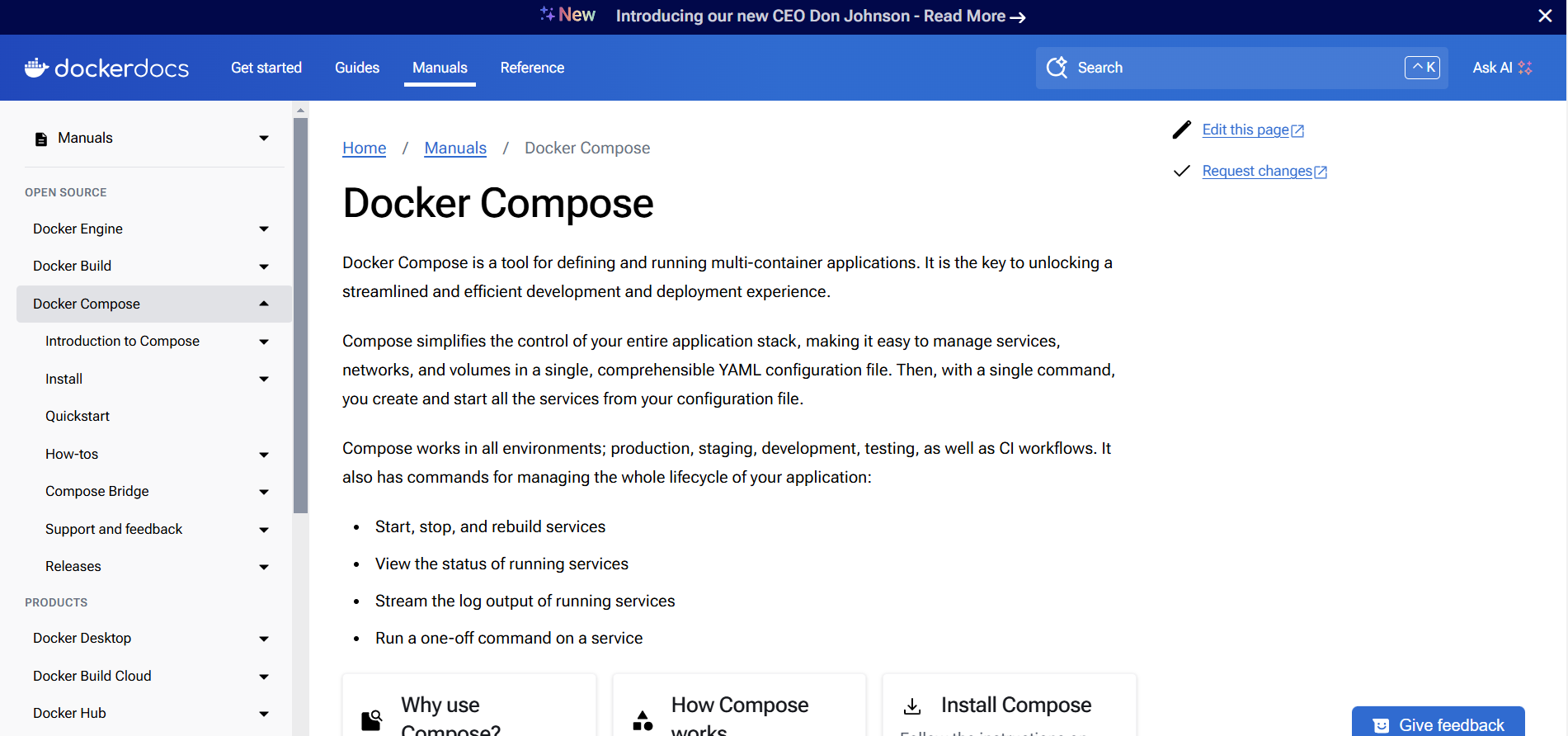
Docker Compose is a tool for defining and running multi-container Docker applications. While not a full orchestration platform like Kubernetes, it is widely used for development, testing, and simple deployments where complex orchestration is not required.
Docker Compose vs Kubernetes
Docker Compose focuses on local development and testing, providing a simple way to manage multi-container setups using a YAML configuration file. It lacks the advanced orchestration features of Kubernetes, but its simplicity makes it ideal for small-scale or single-host deployments.
Key Features of Docker Compose
Easy multi-container configuration with YAML
Simple service orchestration for development
Support for environment variables and scaling
Quick setup for local testing
Docker Compose Pros
User-friendly and easy to configure
Ideal for local development and small projects
Simplifies container management on a single host
Docker Compose Cons
Not designed for production-grade orchestration
Lacks advanced features like auto-scaling and self-healing
Limited to single-host deployments
Docker Compose Pricing
Docker Compose is included in Docker subscription plans. The Personal plan is free, while the Pro plan costs $9 per user per month (billed annually) or $11 per month (billed monthly). The Team plan is priced at $15 per user per month (billed annually) or $16 per month (billed monthly), and the Business plan costs $24 per user per month (billed annually). These plans also include other Docker features like Docker Desktop and Docker Hub
3. Apache Mesos
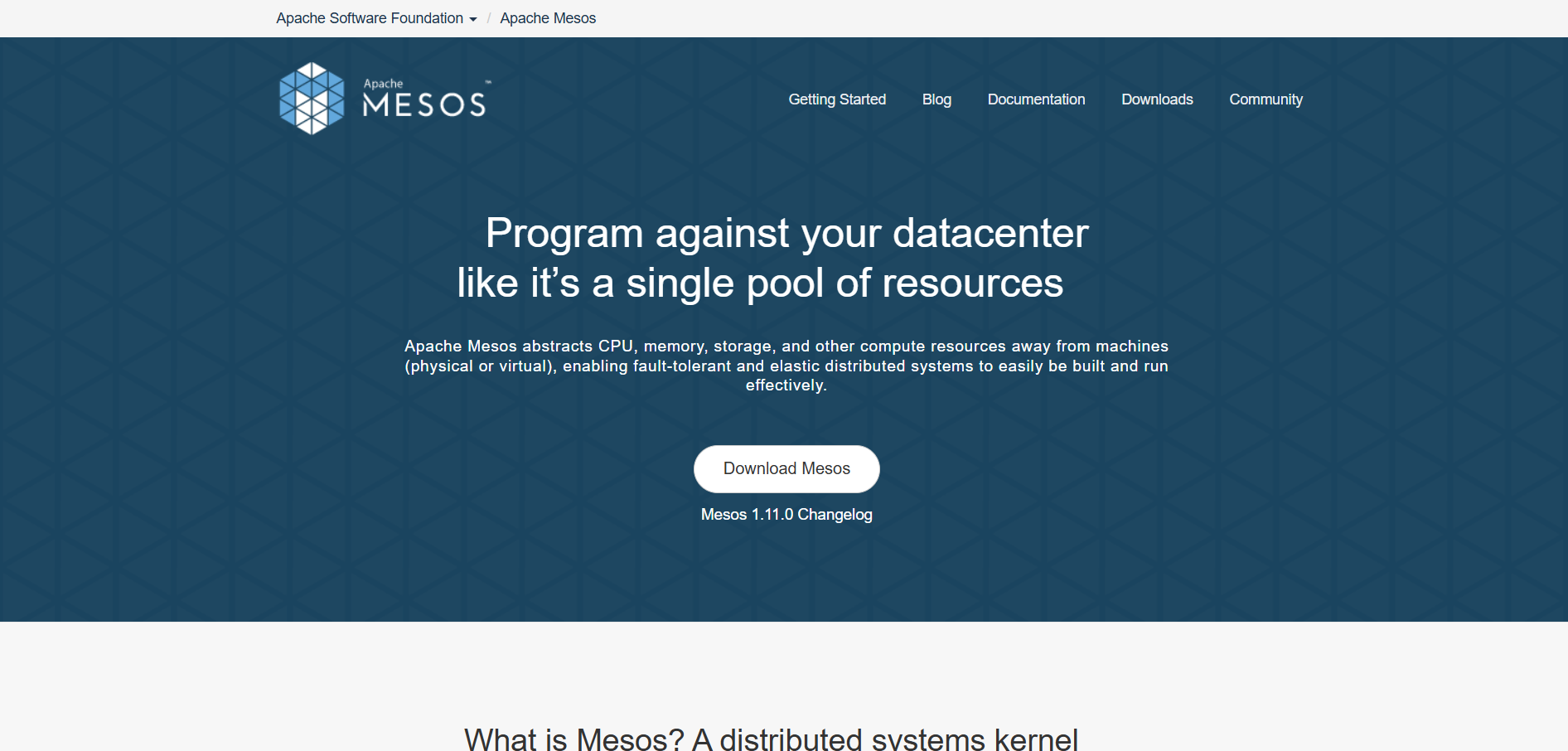
Apache Mesos is a distributed systems kernel that abstracts CPU, memory, storage, and other compute resources, enabling efficient cluster management. It can run Kubernetes as well as its own native workloads, offering a versatile solution for large-scale deployments.
Apache Mesos vs Kubernetes
Apache Mesos provides a flexible, scalable platform for managing clusters and supports various frameworks, including Kubernetes. Its design is suited for large-scale environments, although its complexity may present a steeper learning curve compared to Kubernetes.
Key Features of Apache Mesos
Resource isolation and sharing across clusters
Scalable cluster management
Support for multiple frameworks
Fault tolerance and high availability
Apache Mesos Pros
Highly scalable for large data centers
Versatile in running different workloads
Strong community and enterprise support
Apache Mesos Cons
Complex setup and configuration
Steeper learning curve for new users
May require significant expertise to manage effectively
Apache Mesos Pricing
Apache Mesos is an open-source platform and is free to use under the Apache License. However, enterprise support and additional managed services may incur costs depending on the provider offering these services.
4. OpenShift
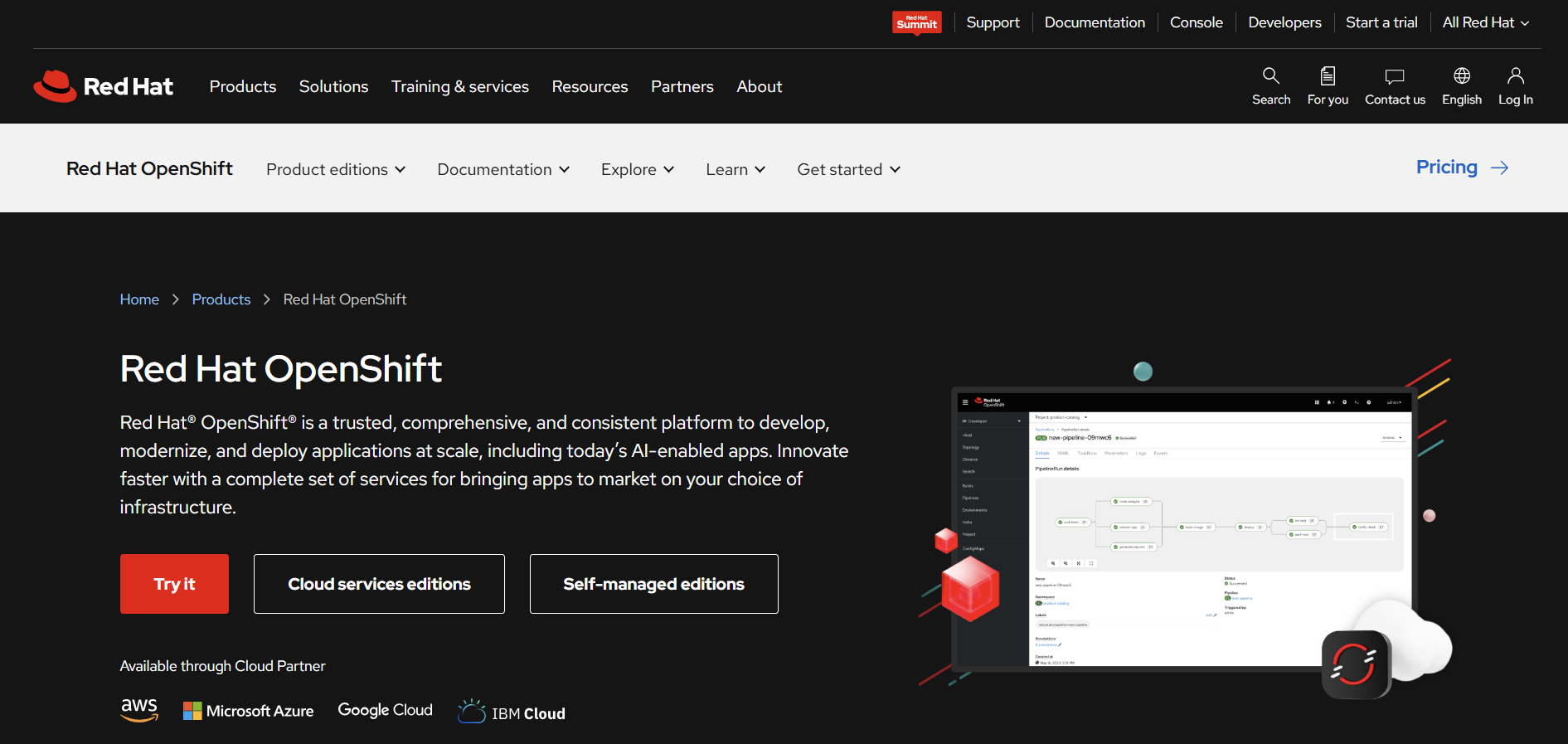
OpenShift, developed by Red Hat, is an enterprise Kubernetes distribution that adds developer and operational tools to the core Kubernetes platform. It offers robust security features, integrated CI/CD pipelines, and a rich ecosystem of enterprise tools.
OpenShift vs Kubernetes
While OpenShift is built on Kubernetes, it extends its capabilities with additional features such as enhanced security, integrated developer tools, and enterprise support. This makes OpenShift a compelling choice for organizations that require a turnkey solution with added value.
Key Features of OpenShift
Enterprise-grade Kubernetes distribution
Integrated developer and CI/CD tools
Enhanced security and compliance features
Multi-tenancy and robust user management
Rich ecosystem of supported integrations
OpenShift Pros
Comprehensive enterprise support
Enhanced security and compliance out-of-the-box
Rich set of built-in developer tools
Seamless integration with Red Hat’s ecosystem
OpenShift Cons
Higher complexity compared to vanilla Kubernetes
Steeper learning curve for new users
Potentially higher costs for enterprise editions
OpenShift Pricing
OpenShift offers multiple pricing models depending on deployment. For Red Hat OpenShift Service on AWS (ROSA), there is an hourly cluster fee of $0.03 and a worker node fee of $0.171 per 4 vCPU/hour for on-demand usage. Discounts are available for 1-year and 3-year reserved instances, reducing the worker node fee to approximately $998 and $665 per year, respectively.
Self-managed OpenShift subscriptions are priced based on core-pairs or bare metal socket-pairs, with options for Standard or Premium support levels. Pricing starts at $0.076/hour for cloud-based OpenShift instances.
5. Amazon ECS
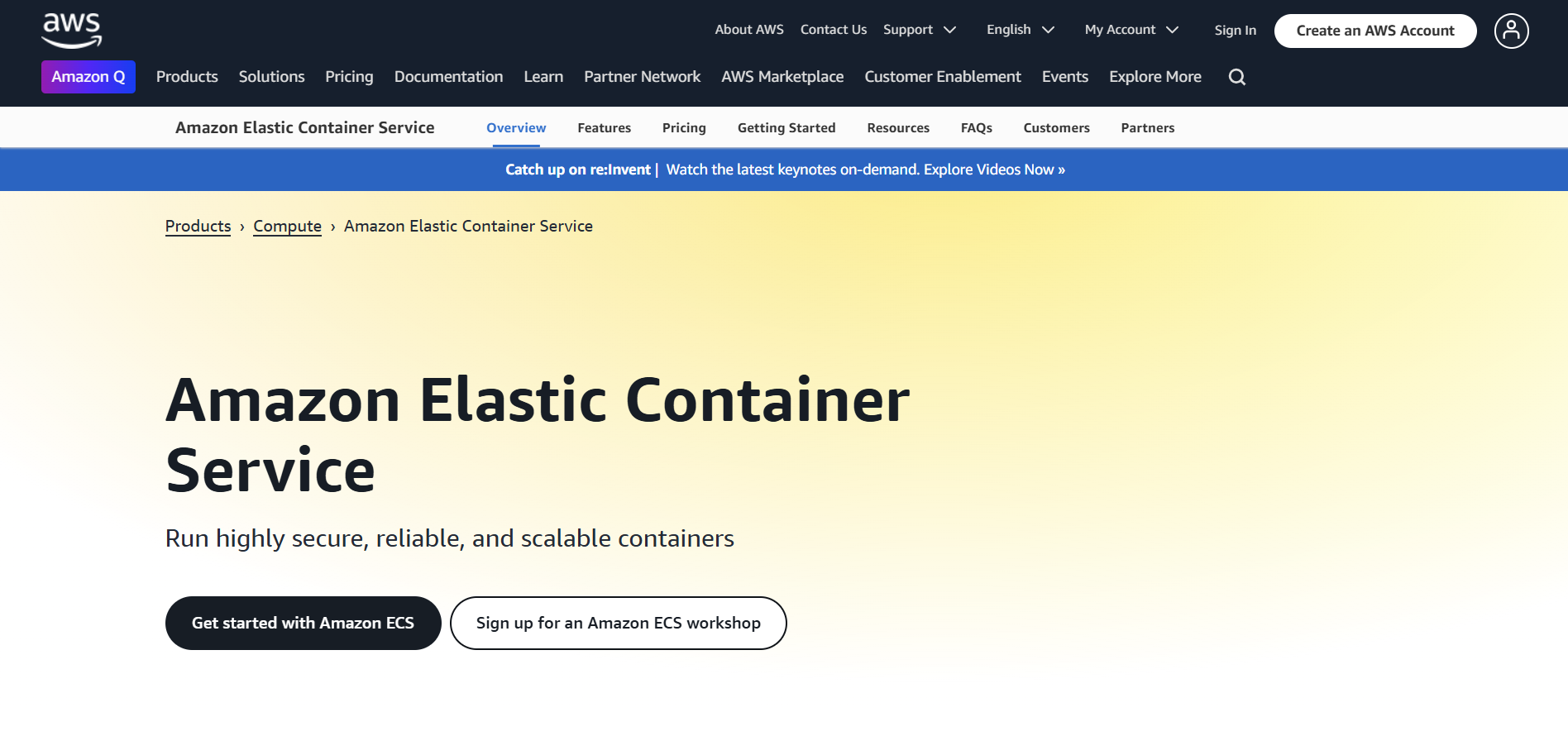
Amazon Elastic Container Service (ECS) is a fully managed container orchestration service that integrates deeply with the AWS ecosystem. It provides a scalable, secure platform for running containerized applications without the operational overhead of managing Kubernetes clusters.
Amazon ECS vs Kubernetes
Amazon ECS simplifies container orchestration by leveraging AWS’s infrastructure and services. While it lacks some of the open-source flexibility of Kubernetes, its tight integration with other AWS services makes it an attractive choice for organizations already invested in the AWS ecosystem.
Key Features of Amazon ECS
Fully managed container orchestration on AWS
Seamless integration with AWS services
High scalability and performance
Built-in security and compliance features
Flexible deployment options
Amazon ECS Pros
Deep AWS integration simplifies management
Highly scalable and secure
Reduced operational overhead
Pay-as-you-go pricing model
Amazon ECS Cons
Less flexibility outside of AWS
Limited open-source community compared to Kubernetes
May require AWS-specific expertise
Amazon ECS Pricing
Amazon ECS does not have additional costs for using the service itself; you only pay for the underlying resources. With the AWS Fargate launch type, you are charged based on the vCPU and memory requested, with a one-minute minimum charge per container. For the EC2 launch type, you pay for the EC2 instances and EBS volumes used.
Additionally, Amazon ECS Anywhere charges $0.01025 per hour per managed on-premises instance, with a free tier offering 2,200 instance hours per month for six months.
6. Rancher
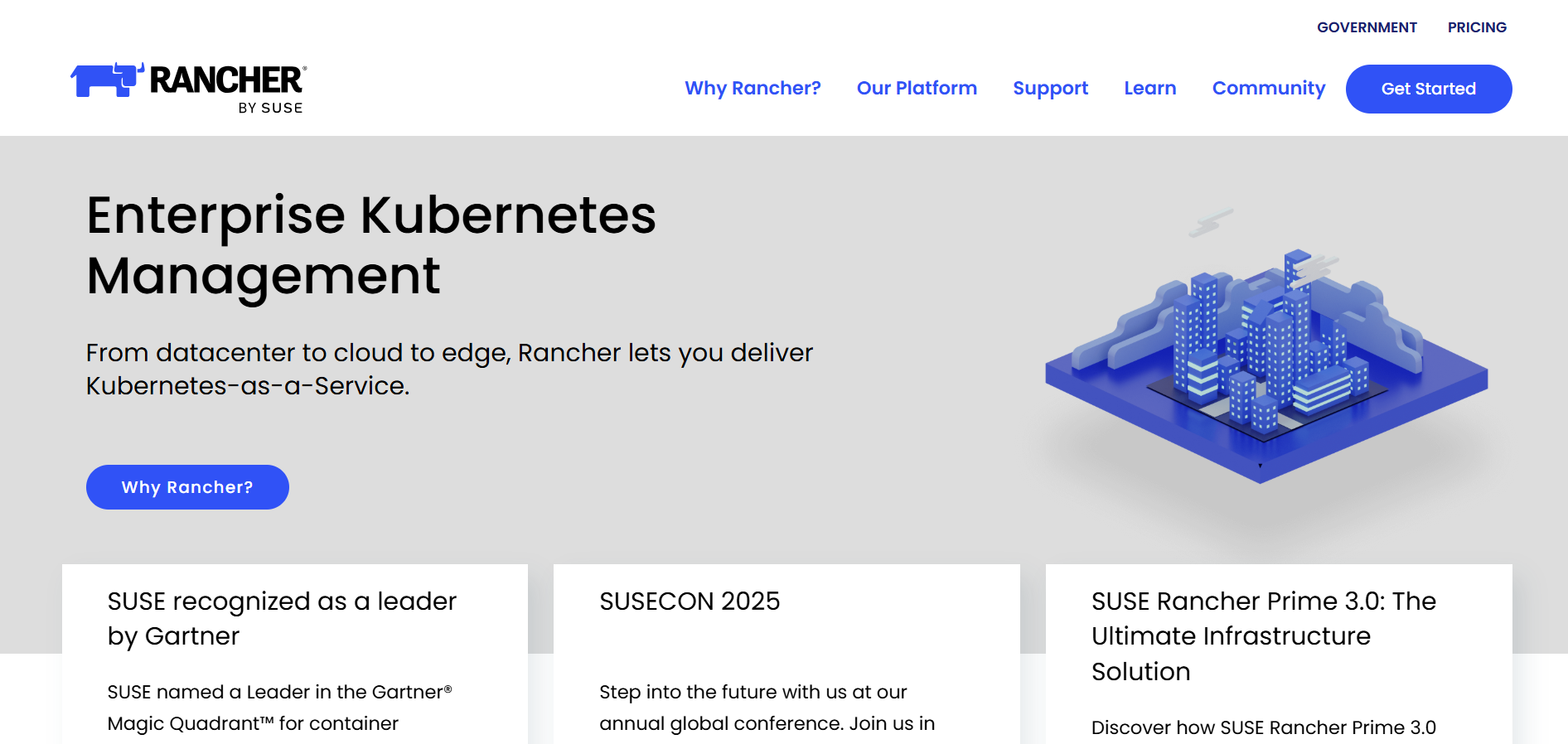
Rancher is a comprehensive container management platform that simplifies the deployment, management, and scaling of Kubernetes clusters across multiple environments. It provides a unified interface to manage clusters, whether on-premises or in the cloud.
Rancher vs Kubernetes
While Rancher is not an orchestration engine itself, it excels at managing multiple Kubernetes clusters and streamlining operations. Rancher enhances Kubernetes by offering centralized management, security, and monitoring capabilities across diverse infrastructures.
Key Features of Rancher
Centralized management of multiple Kubernetes clusters
User-friendly interface and unified dashboard
Enhanced security and policy management
Multi-cloud and hybrid deployment support
Extensive monitoring and logging tools
Rancher Pros
Simplifies multi-cluster management
Intuitive user interface
Enhanced security and governance features
Supports diverse environments (cloud, on-premises, hybrid)
Rancher Cons
Dependent on underlying Kubernetes clusters
May add complexity in very small environments
Requires some initial setup and configuration
Rancher Pricing
Rancher offers subscription-based pricing depending on the deployment scale. For SUSE Rancher, plans range from $7,594.99 annually for up to 500 nodes to $41,830.99 for a management server priority subscription.
Rancher Prime pricing varies by node count: $450 per node monthly for 5–15 nodes, decreasing to $100 per node monthly for over 1,000 nodes.
7. Nomad
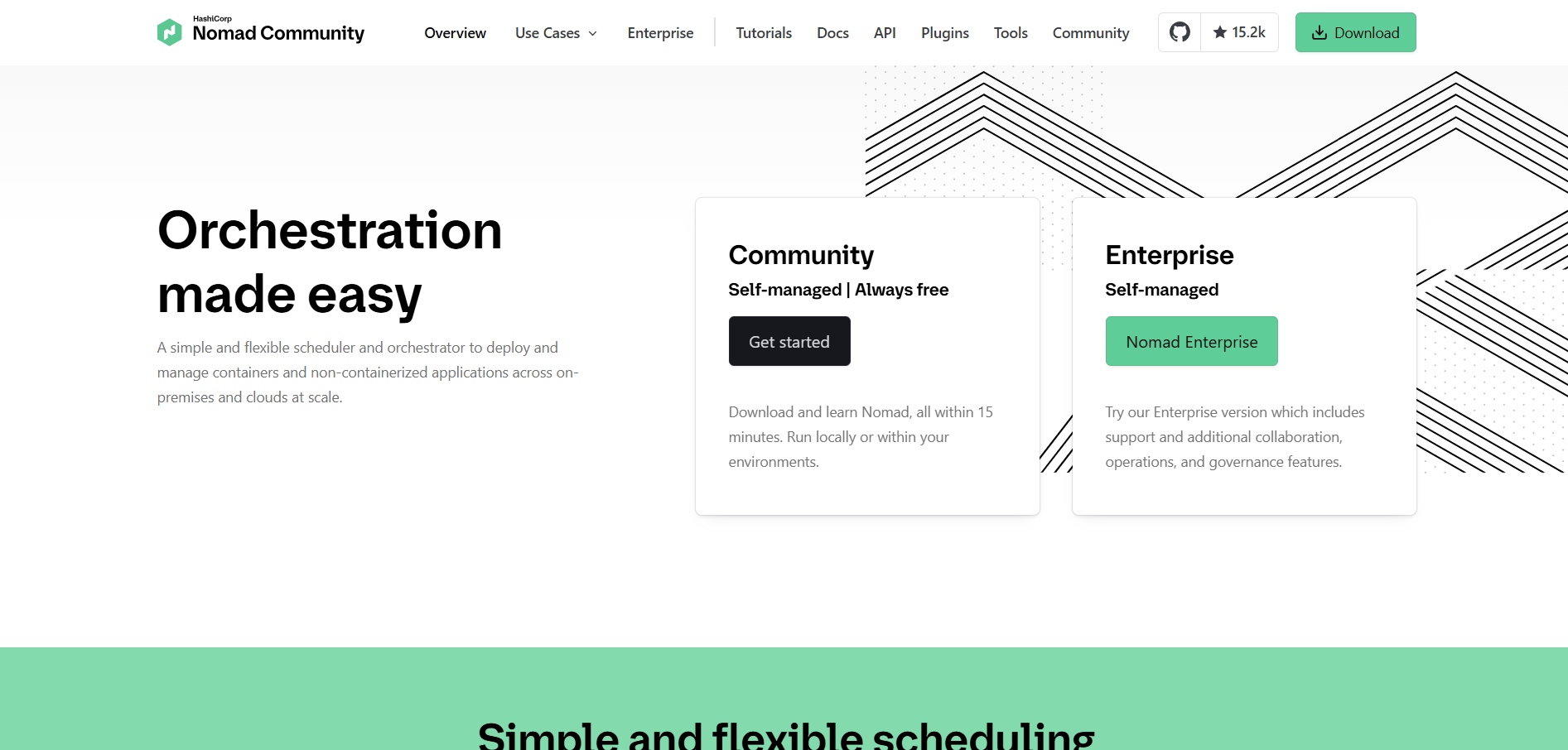
Nomad, developed by HashiCorp, is a lightweight and flexible workload orchestrator that supports containerized and non-containerized applications. It provides a simple yet powerful platform for managing diverse workloads with a minimal operational footprint.
Nomad vs Kubernetes
Nomad offers a more streamlined approach to orchestration compared to Kubernetes. It is designed for simplicity and ease of use, making it an excellent choice for organizations that require a flexible orchestrator without the overhead of Kubernetes.
Key Features of Nomad
Lightweight and easy to deploy
Supports both containerized and legacy applications
Flexible scheduling and deployment options
High scalability and performance
Integrates well with other HashiCorp tools
Nomad Pros
Simple and lightweight orchestration
Versatile – supports multiple workload types
Easy to integrate with existing workflows
Lower resource overhead
Nomad Cons
Less mature ecosystem compared to Kubernetes
Fewer built-in features for complex orchestration
Limited community support relative to Kubernetes
Nomad Pricing
Nomad is an open-source orchestration tool by HashiCorp and is free to use under its open-source license. However, enterprise users can opt for Nomad Enterprise, which includes advanced features like multi-region federation and governance policies. Pricing details for Nomad Enterprise typically involve custom quotes based on organizational needs.
8. MicroK8s
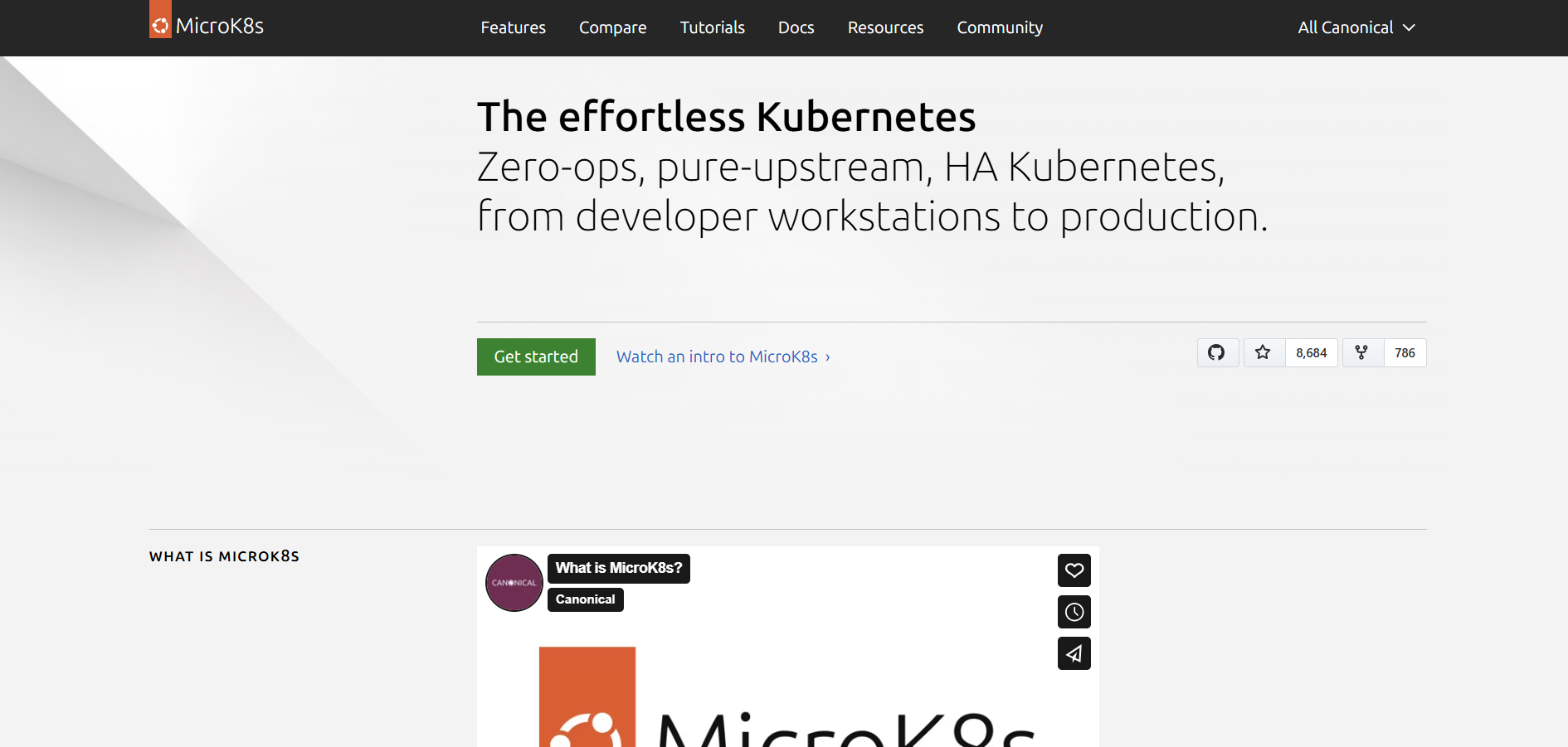
MicroK8s is a lightweight, single-package Kubernetes distribution developed by Canonical. It is designed for developers, edge computing, and IoT environments, providing a simplified and streamlined way to run Kubernetes locally or on resource-constrained devices.
MicroK8s vs Kubernetes
MicroK8s delivers the full power of Kubernetes in a simplified, lightweight package. It is ideal for local development, edge computing, and small-scale deployments, offering a fast and easy setup without the complexity of a full Kubernetes installation.
Key Features of MicroK8s
Single-package Kubernetes distribution
Easy installation and setup
Optimized for local development and edge computing
Low resource footprint
Automatic updates and add-ons
MicroK8s Pros
Simplified deployment and management
Ideal for development and testing
Lightweight and resource-efficient
Fast setup and easy configuration
MicroK8s Cons
Not intended for large-scale production clusters
Limited scalability compared to full Kubernetes
Fewer enterprise-grade features
MicroK8s Pricing
MicroK8s is a lightweight Kubernetes distribution provided by Canonical and is free of charge as an open-source tool. Managed services for MicroK8s through providers like Elestio are billed based on resource usage (hourly credit costs). For example, infrastructure costs on AWS Marketplace may include charges like $0.05/hour for t2.medium instances or $0.193/hour for t2.xlarge instances when paired with Ubuntu Pro images.
FAQs on Kubernetes Alternatives
1. What are the top alternatives to Kubernetes?
The top alternatives to Kubernetes include Docker Swarm, Docker Compose, Apache Mesos, OpenShift, Amazon ECS, Rancher, Nomad, and MicroK8s. Each offers a different balance of simplicity, scalability, and feature sets to suit various deployment needs.
2. Why should I consider using an alternative to Kubernetes?
Alternatives to Kubernetes may offer simpler setups, lower operational overhead, or specialized features better suited to your specific environment—whether it’s local development, enterprise-grade deployments, or lightweight orchestration.
3. Are Kubernetes alternatives free to use?
Many Kubernetes alternatives are open source and free, such as Docker Swarm, Docker Compose, Nomad, and MicroK8s. Others, like OpenShift and Amazon ECS, offer both free tiers and paid plans with additional features and support.
4. Which Kubernetes alternative is best for production environments?
For production environments, enterprise solutions like OpenShift, Amazon ECS, and Rancher provide robust features, security, and scalability. The best choice depends on your specific needs, existing infrastructure, and technical expertise.
5. Can I use Kubernetes alternatives for both development and testing?
Yes, many alternatives such as Docker Compose and MicroK8s are ideal for development and testing environments due to their simplicity and ease of setup, while others like Nomad offer versatility for both production and non-production workloads.